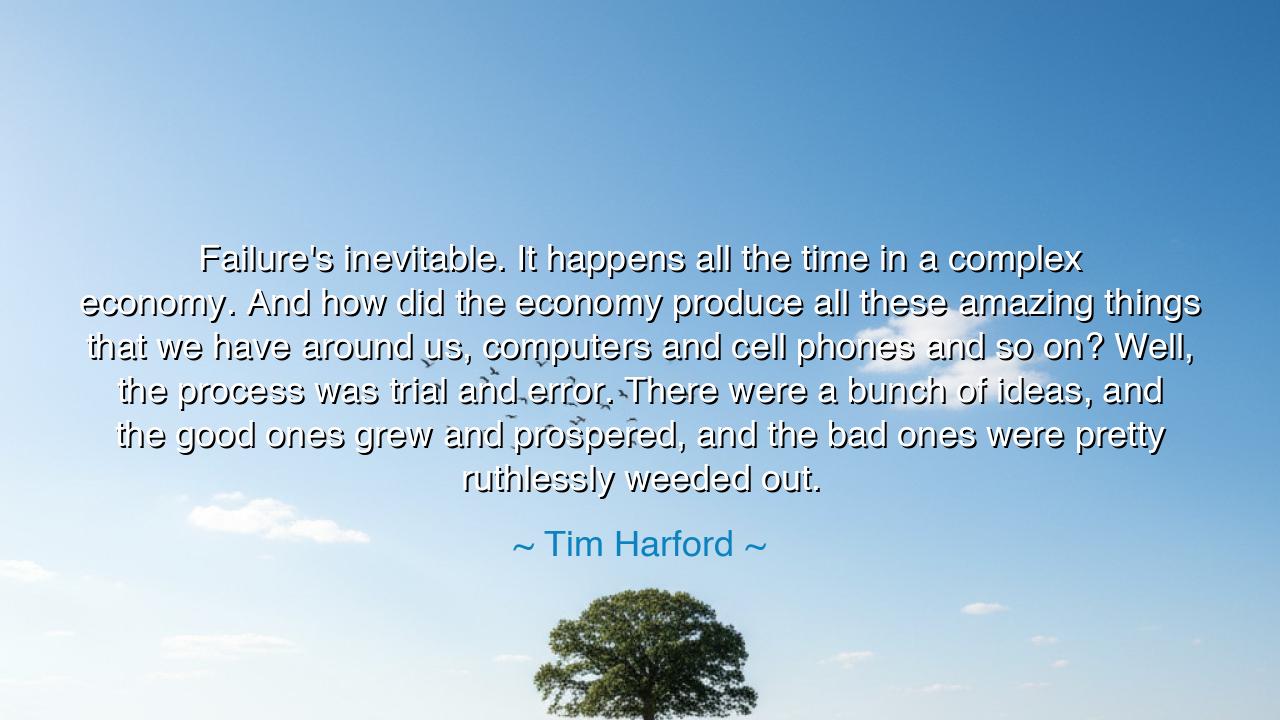
Failure's inevitable. It happens all the time in a complex
Failure's inevitable. It happens all the time in a complex economy. And how did the economy produce all these amazing things that we have around us, computers and cell phones and so on? Well, the process was trial and error. There were a bunch of ideas, and the good ones grew and prospered, and the bad ones were pretty ruthlessly weeded out.






Listen, O children of the earth, to the words of Tim Harford, who speaks of the nature of failure and the process of progress in a world that thrives on trial and error: "Failure's inevitable. It happens all the time in a complex economy. And how did the economy produce all these amazing things that we have around us, computers and cell phones and so on? Well, the process was trial and error. There were a bunch of ideas, and the good ones grew and prospered, and the bad ones were pretty ruthlessly weeded out." These words carry the wisdom of the ages—of the unseen force of failure, which, though feared and avoided, is also the very foundation upon which the edifice of success is built.
In the ancient world, the builders of civilizations understood that the path to greatness was not a straight line but a winding road filled with mistakes, setbacks, and errors. The great pyramids of Egypt, for instance, were not the result of a flawless process but of trial and error, of attempts that failed, of designs that did not work, until, finally, the perfect design emerged. Harford’s insight reminds us that failure is not the end but a necessary part of the journey—it is the weeding process through which only the strongest ideas survive and thrive. Without failure, there can be no success; without mistakes, there can be no growth.
Consider the legend of Thomas Edison, whose invention of the light bulb is often regarded as one of the most important achievements in human history. Yet, few remember the thousands of failed experiments that Edison went through in his quest for the perfect filament. He did not see each failure as defeat but as part of the process, as steps forward in the journey toward his goal. In the end, Edison famously said, "I have not failed. I've just found 10,000 ways that won't work." This attitude of perseverance, of embracing failure as part of the journey, is what led him to one of the greatest inventions of all time.
Harford’s words point to a larger truth: failure is inevitable in a world driven by innovation and complexity. The economy, like the ancient marketplaces of old, thrives not on perfection but on diversity of thought and experimentation. Just as the ancient traders would try different wares, different methods, until they found something that worked, so too does the modern world of technology and business experiment with countless ideas, each one tested, refined, and sometimes discarded. The best ideas grow, and the bad ones are weeded out, not by some divine hand, but by the brutal forces of trial and error.
The great lesson here, O children of the earth, is one of resilience and adaptability. Failure is not a sign of defeat, but a necessary step toward progress. The process of trial and error teaches us that success is not given; it is earned through persistent effort, through learning from missteps, and by adapting to what works and what does not. It is the natural order of things, a rhythm that has guided humanity from the beginning, whether in the construction of great cities, the development of agriculture, or the advancement of science and technology. Without the failure of ideas that do not work, we would not have the brilliance of those that do.
In your own life, O seekers of wisdom, embrace failure as a companion on your journey, not an adversary. Do not fear making mistakes, for in those mistakes lie the lessons that will guide you toward your success. Each failure is a stepping stone, a mark of progress, not a roadblock. Just as the greatest civilizations were built on the lessons learned from missteps, so too can your personal growth be shaped by your ability to adapt, to learn, and to persist.
Remember this, O children of the earth: failure is inevitable, but it is also the gateway to greatness. Like the great builders of the past, understand that each setback is not the end but a part of the greater story, a necessary ingredient in the process of success. Persist in the face of failure, learn from each mistake, and know that through trial and error, you are not only moving closer to your goals but also shaping a life that is rich with wisdom and achievement.






AAdministratorAdministrator
Welcome, honored guests. Please leave a comment, we will respond soon